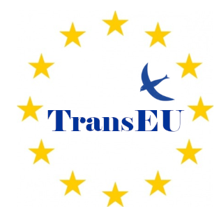Roadmap
The project Transcultural Europe in the Global World (TransEu) focuses on intra-European forms of mobility and on how they are at the base of cultural transformation phenomena, in a world increasingly defined by the notions of “superdiversity” and “hypermobility”. This project considers the transcultural dimension of the contact between different cultures and languages within the EU as a major political factor for social change, which calls for new conceptual tools in order to update the methods and practice currently in use in the study of culture. A corpus of migration narratives and testimonies will be placed at the center of multidisciplinary debate in seminars, workshops and colloquiums, which invest in new approaches to the transformation processes resulting from the confrontation and dialogue between cultures at the local, national, European and world scales.
The cultural, social and political configuration of Europe is the ever-changing result of a collective history of cultural exchanges in confrontation with complex individual trajectories. The European Union plays a major role in defining transnational strategies for a productive interaction and dialogue, in line with the spirit of the Horizon 2020, the Creative Europe investment and the European Neighbourhood Instrument programmes.
In order to face the ongoing changes in the global world, Europe can play an important role by recognising the transcultural potential which lies within social end cultural challenges. Culture is a major economic factor and to understand its dynamics is certainly a key political factor. European citizens, as producers of speech and bearers of meaning, play an active role in complex processes which imply the transformation of cultural objects that are reshaped on the basis of constantly changing circumstances. A transcultural approach allows for a European citizenship resulting from the interaction between several languages-cultures, in close connection to a principle enshrined in the Treaty of Amsterdam (1997) and the EU Charter of Fundamental Rights (2000) – a citizenship based on common values in « respect for the diversity of the cultures and traditions of peoples ».
Objectives
The project Transcultural Europe in the Global World (TransEU) includes a set of scientific and pedagogical activities focusing on phenomena related to European transculturality and on forms of circulation that characterize the « globalized » world. The five seminars and workshops taking place in Nanterre, Cagliari, Coimbra, Rome and Prague are conceived as itinerant stages for exploratory debate in local research groups set up by each staff member in an inter-university and inter-institutional dynamic. By involving different target groups (students, policy makers, representatives of cultural institutions and associations, and general public) in each European country where these activities will be hosted, the project intends to reach a wide local, national and transnational audience, concerned with plurilingualism and dialogue between cultures.
Our approach will firstly invest in finding a common ground for the definition of concepts, which may vary depending on the terminology in use in different countries and research fields. We will secondly focus on the development of a multidisciplinary analysis bridging from social and human sciences (anthropology, sociology, philosophy, history of ideas, political studies, cultural studies, literature and arts) to cross-cultural studies. Intercultural perspectives will be examined within the framework of educational practice at bachelor and master levels in the universities involved in the project; in addition, students will be directly involved in plurilingual workshops.
The results will be presented in a final international conference, which is open to the general public. All team members as well as several external speakers from European institutions, civil society and public or private organizations operating in Europe are expected to participate in this closing event. The resulting transdisciplinary conceptual tools and the critical exchange of research findings will allow to formulate a common proposal for the successful consolidation of participative democratic processes in the European Union.
Activities
In order to understand this changing reality, our epistemological approach aims at dealing with cultural objects in order to understand their specificity as constitutive elements of our present. In view of our objectives, we propose a set of activities of a scientific and pedagogical nature. These will involve a variety of actors and will be disseminated to a wide audience: researchers, young researchers, students, cultural professionals, political decision-makers at local, national and European level, civil society members and the media. All our activities will take place in English and in the language of the host country, but other European languages will be accepted and, if necessary, translated, as plurilingualism is an essential component of transculturality as we understand it.
The seminars taking place in our program will reflect the ongoing work which is being conducted by the different groups that have been set up within the project team in close articulation with local institutional interlocutors. Educational and creative workshops will include the participation of students, as well as the screening and discussion of documentary films. This program will take place in four different European countries (France, Italy, Portugal, Czech Republic), but will also involve collaborators from Spain, the Netherlands, Romania and the Balkans which are part of the research network of the staff members. Not only these countries are emblematic of certain migration issues and intra-European mobilities, but they can also be considered as appropriate laboratories for our wider research concerning the European territory.
The five scientific meetings will have a strong methodological component, as they will focus on conceptual and theoretical categories used in the analysis of a corpus of migration narratives, testimonies and other forms of artistic expression. Questions of narrative identity and self-narrative will be raised as means for deconstructing stereotypes and speeches which support discrimination and intolerance. On the one hand, the role of intercultural dialogue approaches in educational practice will be the subject of in-depth reflection regarding the development of the intercultural and interlinguistic competences and the cultural quotient; on the other hand, practical workshops involving students will be conducted in bachelor and master courses in the involved universities. Our activities will highlight the creative dimension of transculturality in contemporary artistic and multi-media production, which is in line with a vision of culture as a factor for social cohesion and a « transforming strength for the regeneration of communities », as proposed by the European Agenda for Culture in the Era of Globalisation.
The international colloquium will bring together all the partners and several external speakers in order to present, discuss and make an overall assessment of the results of the project. Concrete proposals will then be made to the scientific community, governmental and non-governmental organisations, cultural associations as well as elected representatives and political decision-makers. Through a concerted dissemination strategy, we aim at establishing dialogue with cultural institutions, policy makers and civil society at the local, national and European levels in order to transmit the expertise gained through the Jean Monnet project in the fields of research and education.
The results of the project will be made available to the general public through online resources: the programme of activities, the composition of an international team of researchers and public and private organisations involved in the project can be found in the project’s website. The University Paris Nanterre webTV will broadcast some of the activities of the project, which will then be archived in digital platforms. A later stage of dissemination will include the publication of a scientific volume on the subject of the Transcultural Europe (also available in an open access format) and the holding of several book launch sessions. Among the academic outreach activities, we plan to produce a brochure of the Jean Monnet Project Transcultural Europe in the Global World, in several languages, in order to present it on the occasion of the European Day and other related events.

